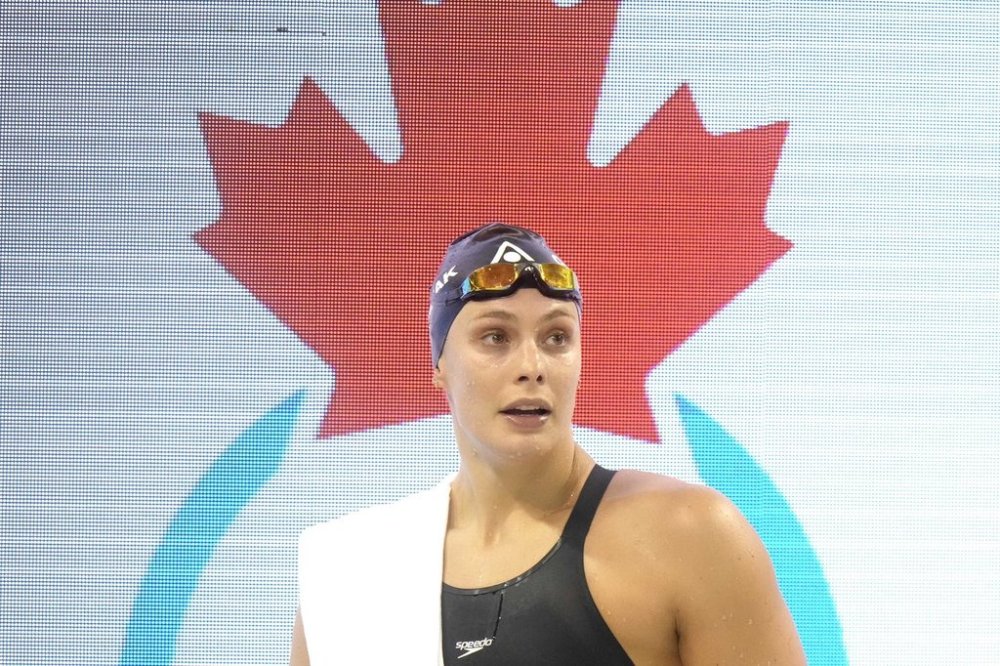Canadian swimmer Penny Oleksiak suspended two years for anti-doping rule violation
Advertisement
Read this article for free:
or
Already have an account? Log in here »
We need your support!
Local journalism needs your support!
As we navigate through unprecedented times, our journalists are working harder than ever to bring you the latest local updates to keep you safe and informed.
Now, more than ever, we need your support.
Starting at $15.99 plus taxes every four weeks you can access your Brandon Sun online and full access to all content as it appears on our website.
Subscribe Nowor call circulation directly at (204) 727-0527.
Your pledge helps to ensure we provide the news that matters most to your community!
To continue reading, please subscribe:
Add Brandon Sun access to your Free Press subscription for only an additional
$1 for the first 4 weeks*
*Your next subscription payment will increase by $1.00 and you will be charged $20.00 plus GST for four weeks. After four weeks, your payment will increase to $24.00 plus GST every four weeks.
Read unlimited articles for free today:
or
Already have an account? Log in here »
Canada’s most decorated female Olympian has been suspended for two years from her sport for an anti-doping rule violation.
Toronto’s Penny Oleksiak, winner of seven Olympic medals in swimming, has not tested positive for a banned substance. But she failed three times between October 2024 and June 2025 to fulfil whereabouts requirements under anti-doping rules.
The suspension announced Tuesday by the International Testing Agency ends July 14, 2027, which makes Oleksiak eligible to compete in a fourth Olympic Games in Los Angeles in 2028 if she chooses.

Anti-doping rules state that athletes must be found for random testing.
They’re required on a quarterly basis to provide their daily addresses (home, hotel or otherwise), training and competition locations and schedules, school location and schedule, work schedule or medical appointments, and a 60-minute window each day that they’re available for testing.
The Canadian Centre for Ethics in Sport sends out email reminders to Canadian athletes before the last day of the month preceding each quarter.
The onus is on athletes to submit their information, and update any changes, through the web-based Anti-Doping Administration and Management System (ADAMS) on a computer or on a mobile-phone app.
The World Anti-Doping Code defines a whereabouts failure as any combination of three missed tests or filing failures in a 12-month period.
Oleksiak, who withdrew from July’s world championship and accepted a provisional suspension, has not specified what was deficient about her whereabouts information.
The 25-year-old said in Instagram posts in both July and August “I am and always have been a clean athlete.”
“We accept Penny’s explanation these were inadvertent errors and she has not used banned substances, anti-doping regulations are in place to ensure a level playing field for all athletes,” Swimming Canada chief executive officer Suzanne Paulins said in a statement Tuesday.
“We will miss Penny on the national team and hope to see her back in the pool when she is eligible.”
But Oleksiak has not competed for months and will not race for several more because she didn’t follow whereabouts rules designed to stamp out doping in sport.
“There have been athletes in the past who have inadvertently made errors or the system was down,” said Angela Schneider, who is a former Canadian Olympic rower (1984) and now a director of Western University’s International Centre for Olympic Studies.
“It has been the case that it has happened without somebody who’s trying to cover up doping, but it’s not like it’s all that common.”
Paulins said in the statement that athletes are responsible for completing whereabouts and submitting filings on time to comply with anti-doping rules and avoid sanctions.
Anti-doping rules invade an athlete’s privacy, but are also necessary to catch cheats, Schneider added.
Unannounced testing is necessary because if an athlete knows a tester is coming they can prepare. There have been instances where an athlete has taken clean urine from another person and pumped it into their own bladder with a catheter to provide a clean sample, she said.
“One of the ways to beat that is by not letting the athlete know when you may potentially test them and the only way you can do that is if you know where they are all the time,” Schneider said. “The only other groups in society that we do this with are people who are under house arrest for criminal activity.
“We do not treat people in our society like this very commonly at all. It is a very high invasion of privacy rights. But athletes agree to do it because it gives them at least some possibilities that there’s a better chance that they’re competing on a fairer, leveller playing field.”
After years of training at Toronto’s Pan Am Sports Centre, Oleksiak moved to Mission Viejo, Calif., in 2023 to join a group of international pro swimmers coached by Jeff Julian.
Oleksiak owns seven Olympic medals (one gold, two silver, four bronze) and nine world championship medals (two silver, seven bronze).
Two knee surgeries and a shoulder injury after Tokyo’s Summer Games in 2021 limited her ability to train and race. Oleksiak qualified to race relays in Paris in 2024, but not individual events.
What her suspension does to Oleksiak’s swimming career and reputation remains to be seen.
“Sometimes people stumble and fall and they get back up again,” Schneider said. “As it stands right now, it looks like that ban would go to 2027 so that she could legitimately have paid the price and then come back and compete in 2028 Olympics, if she can qualify within that time frame.
“She won’t have had a positive doping test. She will have had an anti-doping rule violation. There are some nuances here that some Canadians maybe care about and maybe others just don’t.”
This report by The Canadian Press was first published Nov. 25, 2025.
